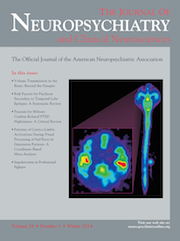Psychosis After Right Temporal Lobe Tumor Resection and Recurrence
To the Editor: There are many psychiatric illnesses associated with structural brain abnormalities.1–4 Psychiatric symptoms and intractable seizures can present as a result of a temporal lobe tumor.1,2,4
We present the case of an 11-year-old girl with three psychiatric admissions, starting at age 9. Her admissions were the result of self-injurious behavior by cutting herself superficially with a razor blade in response to command auditory hallucinations. During her recent admission, quetiapine and divalproex were started, and her psychosis was controlled. She was discharged home to the custody of her mother.
Her medical history is significant for an astrocytoma of the right temporal lobe diagnosed at age 2. The tumor resulted in intractable seizures, and she was started on carbamazepine, followed by a surgical resection at age 3. Since then, she has had no reported seizures, and her recent electroencephalography (EEG) was normal.
A subsequent magnetic resonance imaging (MRI) at age 7 showed an abnormality in the hypothalamus. She developed puberty at age 8 and was started on Lupron depot (leuprolide) monthly. Hypothyroidism and pre-diabetes developed, and she began treatment with levothyroxine and metformin.
Neuropsychiatric testing of her verbal IQ showed a decline from her initial testing at age 9, and she was placed in a special education program for severely impaired students.
A recent MRI showed tumor progression in the frontal, temporal, and hypothalamic region, with loss of a large part of the inferior temporal lobe. Her oncologist started chemotherapy to control the tumor progression. Follow-up MRI showed no changes in tumor size after two cycles.
Discussion
Our case report shows that the patient's psychosis, endocrine abnormalities, and academic decline parallel the recurrence and progression of her brain tumor.
Her initial diagnosis of a temporal lobe tumor coincided with her presentation of intractable seizures. Although her seizures resolved with surgery, she developed hallucinatory symptoms later on from either her tumor recurrence or her gross right temporal lobe brain tissue loss.1,4 Right-side temporal lobe surgery has been reported to have a higher incidence of subsequent psychosis than left temporal lobe surgery, as shown in our case.1
1 : Psychosis following temporal lobe surgery: a report of six cases. J Neurol Neurosurg Psychiatry 1991; 54:639–644Crossref, Medline, Google Scholar
2 : The parahippocampal gyrus as a multimodal association area in psychosis. J Clin Neurosci 2010; 17:1603–1605; available at doi: 10.1016/j.jocn.2010.03.052Crossref, Medline, Google Scholar
3 : Frontal-lobe cognitive dysfunction in conduct disorder adolescents. J Clin Psychol 1990; 46:696–706Medline, Google Scholar
4 : Psychiatric symptoms associated with brain tumors: a clinical enigma. CNS Spectr 2006; 11:28–31Crossref, Medline, Google Scholar



